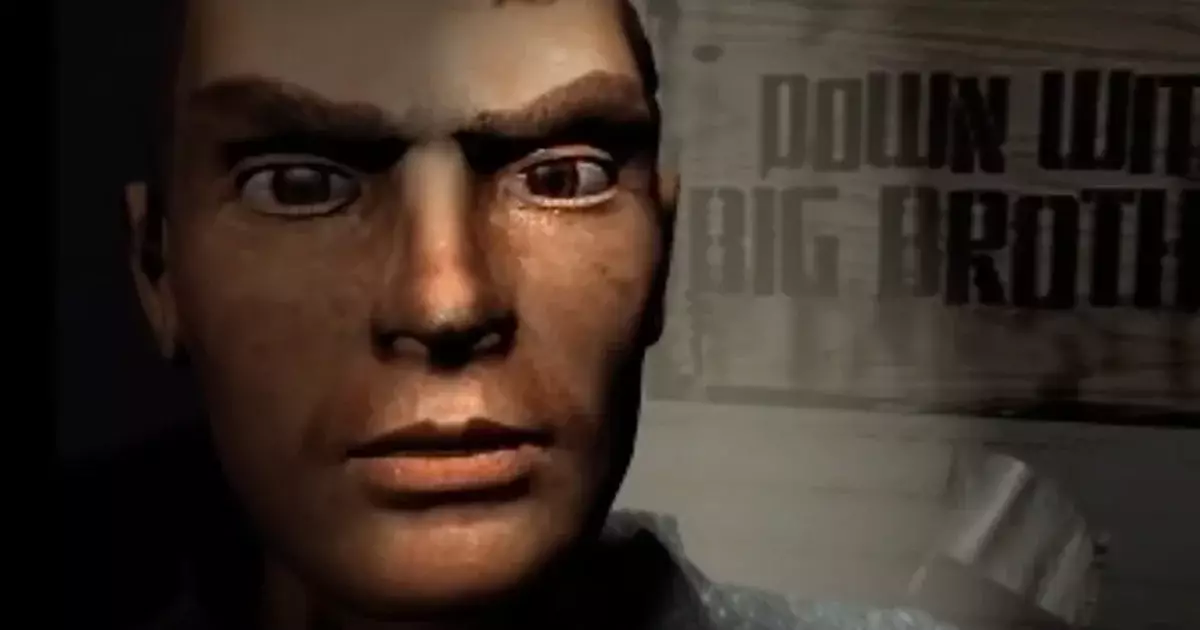George Orwell’s dystopian masterpiece, 1984, has long served as a profound source of inspiration across diverse mediums—from literature to film to interactive gaming. Despite its thematic depth and unsettling relevance in today’s society, there lies an exciting yet forgotten saga revolving around a video game attempt based on this iconic narrative. Many gamers may recall the name when conjuring images of government surveillance and repression; however, few are aware of the almost mythical video game titled *Big Brother*. Recently, an old demo for this enigmatic title surfaced, throwing light on an ambitious project that could have altered the landscape of both gaming and literary adaptation.
Developed in the late 1990s by the American company MediaX, *Big Brother* was poised to merge the depth of Orwellian storytelling with the dynamic and demanding world of video games. Despite capturing interest and accolades at various trade shows, *Big Brother* found itself ensnared in a labyrinth of financial turmoil and licensure issues that cast it into the obscurity of canceled projects. Yet, the resurfacing of this long-lost demo breathes new life into what could have been a pivotal entry in the genre of narrative-driven video games.
The Plot Thickens: A New Protagonist in Orwell’s Universe
As revealed by dedicated digital archaeologists, the plot of *Big Brother* revolved around a character named Eric Blair, which intriguingly mirrors the author’s real name. Players would embark on a quest to liberate Eric’s fiancée while supporting revolutionaries striving against the oppressive Thought Police. The game’s design, broken into 12 levels that promised an immersive five-hour experience each, suggests a grounding in detailed environmental puzzles—elements that were commonplace in gaming yet felt uniquely suited to a narrative steeped in political tension and ethical dilemmas.
Unlike traditional video game adaptations of literature, which often leaned heavily into whimsical or even absurd interpretations, MediaX aimed for a more respectful interaction with Orwell’s themes. The blend of combat and critical thinking, alongside a narrative deeply anchored in the source material, reflected a significant shift in how games could both entertain and provoke thought. The mission briefing footage from the demo offers a glimpse of a more sophisticated weft of storytelling, imbuing the game with a reflective depth that many adaptations severely lack.
The Creative Minds Behind the Game
While little is known about MediaX’s operational methodology, the company’s reputation, as documented by the Time Extension website, indicates a vibrant and eclectic team. They were not just a one-trick pony; the creators of *Big Brother* were also behind varied projects such as *On the Road With BB King*, which showcased their versatility and willingness to explore narrative depths within gaming. However, their attempted foray into Orwell’s world posed immense challenges—namely navigating the heavy thematic elements of repression and betrayal while still crafting an engaging gameplay experience.
Despite the setback of losing the title rights, which essentially sidelined a promising concept, the vision of MediaX succeeded in sparking the curiosity of experts and fans alike. Although we may understandably never witness *Big Brother’s* release as intended, the emergence of this demo reminds us of the untold stories and lost opportunities woven into the fabric of gaming history.
Modern Reflections of Orwellian Themes in Gaming
While *Big Brother* may never grace the shelves of video game retail giants, the drumming echoes of Orwellian discontent continue to pulsate through modern gaming. Titles like *Orwell: Ignorance is Strength* and the upcoming adaptation of 1984 by narrative designer Tom Jubert aim to delve into similar socio-political territories that *Big Brother* intended to explore. These contemporary games retain the core message of Orwell’s text, merging gameplay mechanics with ideological inquiry that resonates with today’s gamers, connecting the past with present societal concerns.
Moreover, as the gaming landscape continues to evolve, the lingering influence of Orwell’s work demonstrates a powerful blend of narrative and interactive art, proving that political commentary can exist within the joyous realms of gameplay. Thus, the tale of *Big Brother*, albeit shrouded in mystery and loss, serves as a profound reminder of the potential for video games to amplify critical discourse—making the unplayable game a testament to the unrelenting power of storytelling in all its form.

